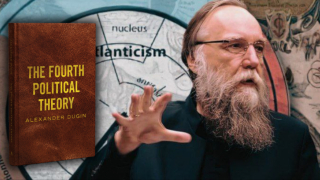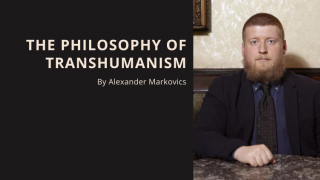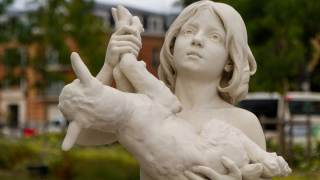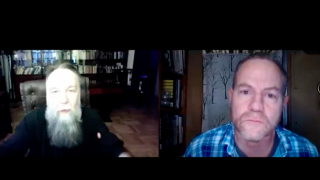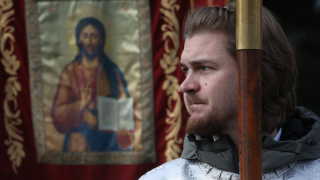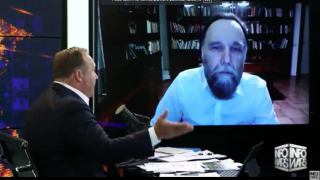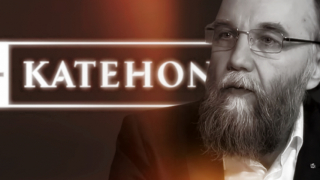Antikeimenos [8]
Antikeimenos and political theology
It is now worth recalling the important role played by katechon in Christian politics, where in the Middle Ages - and partly during the longer period of preservation of the Byzantine paradigm in Eastern Europe (up to the theory of 'Moscow is the third Rome') - it was the presence or absence of an empire that served as the reference point for eschatological time. Christian society naturally held this account on the side of the Catechon, being in solidarity with it and the order embodied in it - the Roman order. But the location of such a vantage point necessarily had to involve Antichemenos, who at any moment could emerge from a gap in the Catechon enclosure of the Christian polis. In other words, the Antichæmenos, which had not been sufficiently conceptualised, was constantly and invariably present at the heart of Christian political thought.
In the 20th century, the importance of katechon for the entire structure of European politics was recalled by the German philosopher Carl Schmitt,[65] after which the term itself was routinely used in the context of extended political science, understanding the state as a secular figure of 'political theology'. Consequently, the katechon - Antiquemenos antithesis also received conceptual content. Especially since the New Era was precisely the period of the shattering of the old order and the socio-political institutions associated with it. This gestalt, therefore, signifies the origin of that historical and political power which aims at the shattering of the structures of traditional society - religious, class, hierarchical. In this case, modernity itself turns out to be an expression of the anti-Cheimenos, since its openly proclaimed aim is to overthrow and demolish traditional systems and institutions. The gestalt of Antikeimenos thus coincides semantically with the concepts of progress, liberalism, modernisation, etc. Antikeimenos means revolution.
A rebellious object
It should be noted, however, that the philosophical term ὑποκείμενον, translated into Latin as sub-jectum, sub-stratum or sub-stantia, is formed in a similar way in Greek. Both in meaning and structure, ἀντικείμενον can mean and means object. There was no strictly delineated subject/object pair in Greek philosophy, but if we do a reverse translation into ancient Greek we get exactly ὑποκείμενον/ἀντικείμενον. Thus ἀντικείμενον is also an object with its full scope of meaning. And, even more precisely, it is above all the 'object', that which is 'in front' of the observer, beyond the outer limit.
In this philosophical sense, anti-Keimenos (perhaps it should be written with a lower case letter here) means that external thing that is beyond the observing presence.
This ambiguity of Antikeimenos as 'Antichrist' and Antikeimenos as object is extremely expressive. The new era of science, culture, politics, ideology represents precisely a shifting of the centre from the subject to the object - towards matter, 'reality', density, into the area of the parts without the whole, i.e. the parts of the unknown of what - of the parts of the absent gestalt. And, as a result, it is entirely possible to speak of the catechonic function of the subject, which remains (where it still exists) the guardian of a sacred order, however weakened and weakened. If the subject is synonymous with the 'political Antichrist', then the subject takes on the meaning and mission of the catechon.
If we now project these consonances onto the increasingly popular object-oriented ontology (OO), the symmetry we have constructed on the basis of the term ὁ ἀντικείμενος will reveal itself even more fully. The philosophers of the OOO themselves distinguish ever more clearly on the outside of things (objects) the sinister features of a dark deity, bearer of absolute horror [66]. The aim of the speculative realists (C. Meijasu[67], H. Harman[68], etc.) is precisely to definitively abolish the subject by freeing from it the autonomous object ontologies previously suppressed by rationalist projections. The overthrow of the structures of order is also the primary goal of this God-fearing power, which acts as katechon's direct opponent in the eschatological scenario.
Antikeimenos and the radical subject
The term 'Antikeimenos' is the equivalent of the term 'radical Antichrist'. It does not add any new properties or characteristics to 'Radical Antichrist', but allows it to operate freely with it - not only in a theological or political theological context, but to resort to it in similar but more abstract cases of religion and religious eschatology, retaining all the profound content of the corresponding primordial metaphysical experience.
Antikeimenos can be applied to philosophy as an object equivalent, but one that already contains a reference to the Loughcraftian reality of the gods of horror or to the irruption of the infracorporeal hordes of Gogs and Magogs from beneath the "Egg of Peace" (in the spirit of R. Guénon's symbolism [69]).
On the other hand, it allows us to detach ourselves from the concreteness of Christian teaching on the end times and to operate freely in dialogue with representatives of other religious traditions, who will find it much easier to accept a neutral term and insert their own content into it. Instead of these syncretic formulas - Dadjal/Anti-Christ - and even more cumbersome ones, one could refer to the Antikeimenos.
Another remarkable feature of this concept is the possibility of its operational use in contexts of political science, sociology and cultural studies - by analogy and in direct symmetry with the concept of katechon, which became widespread following Carl Schmitt's successful interpretation [70].
Finally, Antikeimenos best fits the primordial meaning of that radical ontology that we recognise (if we accept) as traditionalism. And, as such, the term becomes a crucial symmetrical counter-pole to the radical Subject, another figure of radical ontology [71]. Much can be learned from this symmetry and light shed on both gestures. But that is the subject of the next series of studies.
Notes:
[66] Tucker J. The horror of philosophy: in 3 volumes. Т. 3: Tentacles longer than night. Perm: Gile Press, 2019; Harman G. Weird Realism. Lovecraft and philosophy. Perm: HylePress, 2020.
[67] Meiyasu K. After finitude: Essays on the necessity of contingency. - Ekaterinburg; M.: Cabinet Scholar, 2016.
[68] Harman G. The Fourfold Object: The Metaphysics of Things after Heidegger / translated from English by A. Morozov and O. Myshkin. Perm: Gile Press, 2015.
[69] Guénon R. The Realm of Quantity and the Signs of Time.
[70] See for example Cacciari M. The Withholding Power. An essay on political theology. Bloomsbury Academic, 2018 or Agamben J. The Withholding of Time: A Commentary on the Epistle to the Romans. Moscow: New Literary Review, 2018, He. Homo sacer. Sovereign Power and the Naked Life. Moscow: Europa, 2011, etc.
[71] Dugin A. G. Radical subject and its double. Moscow: Eurasian Movement. 2009.
Translation by Lorenzo Maria Pacini


